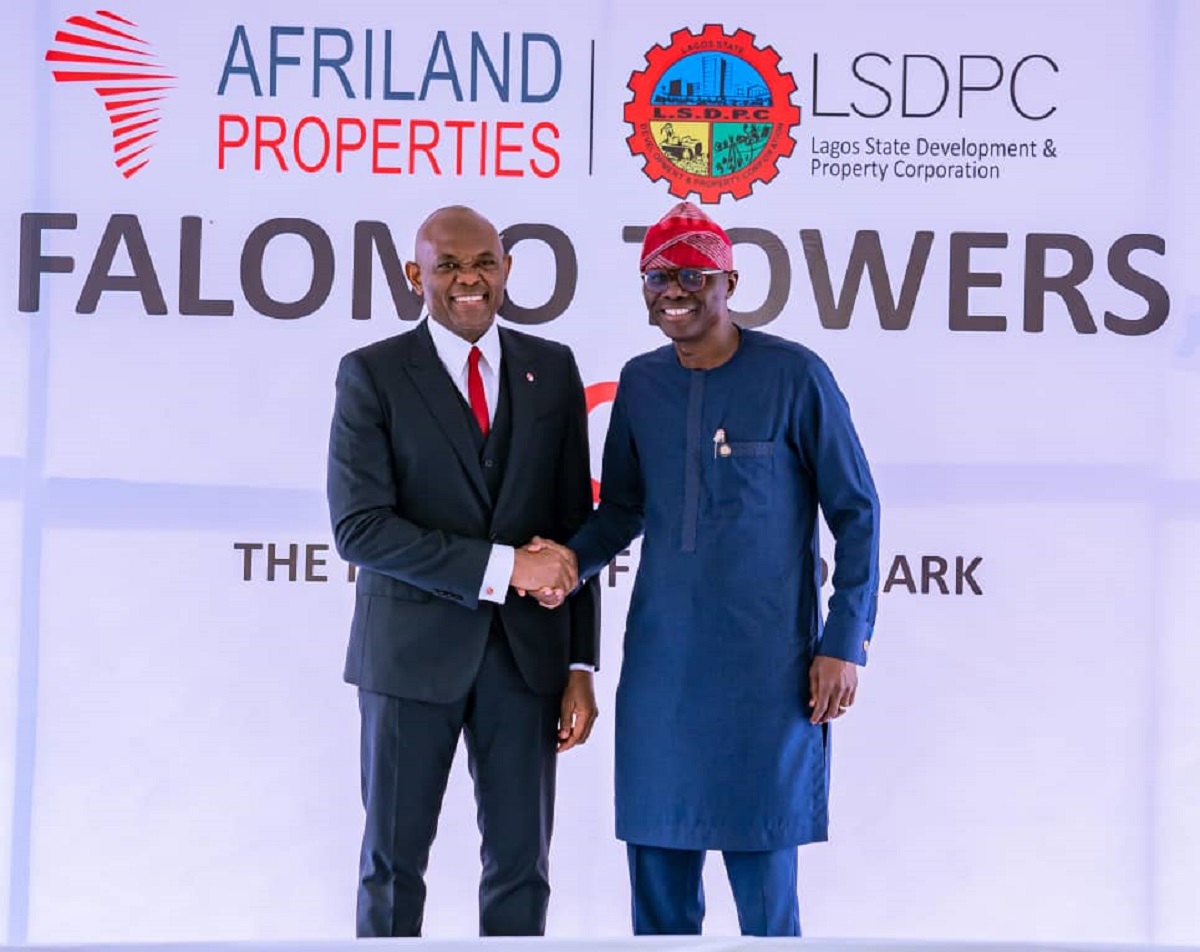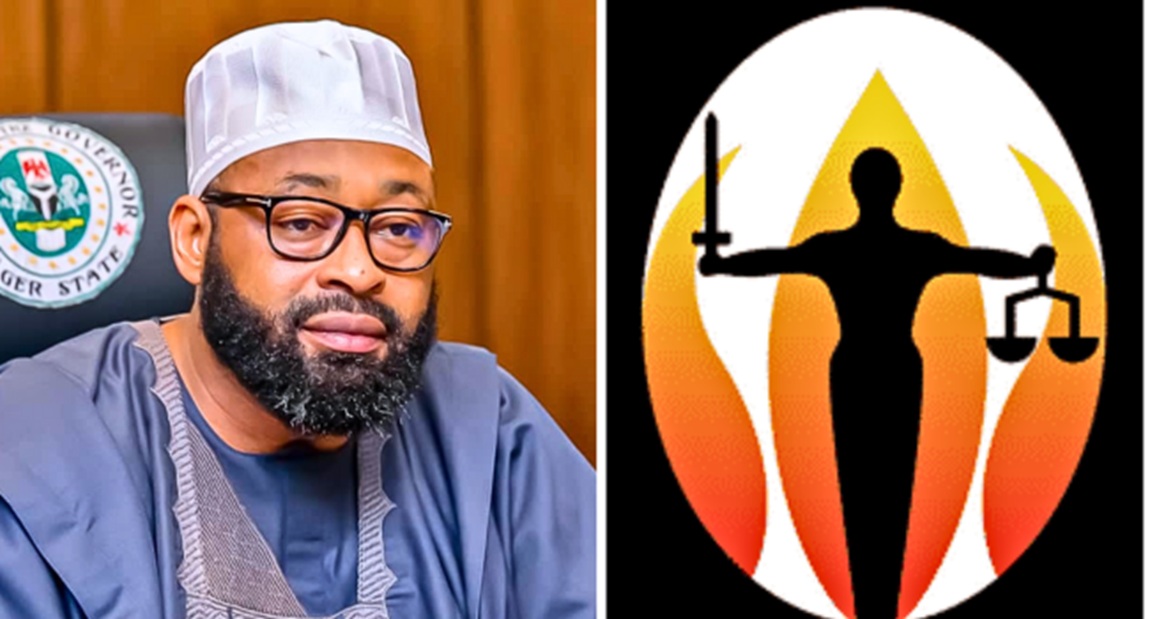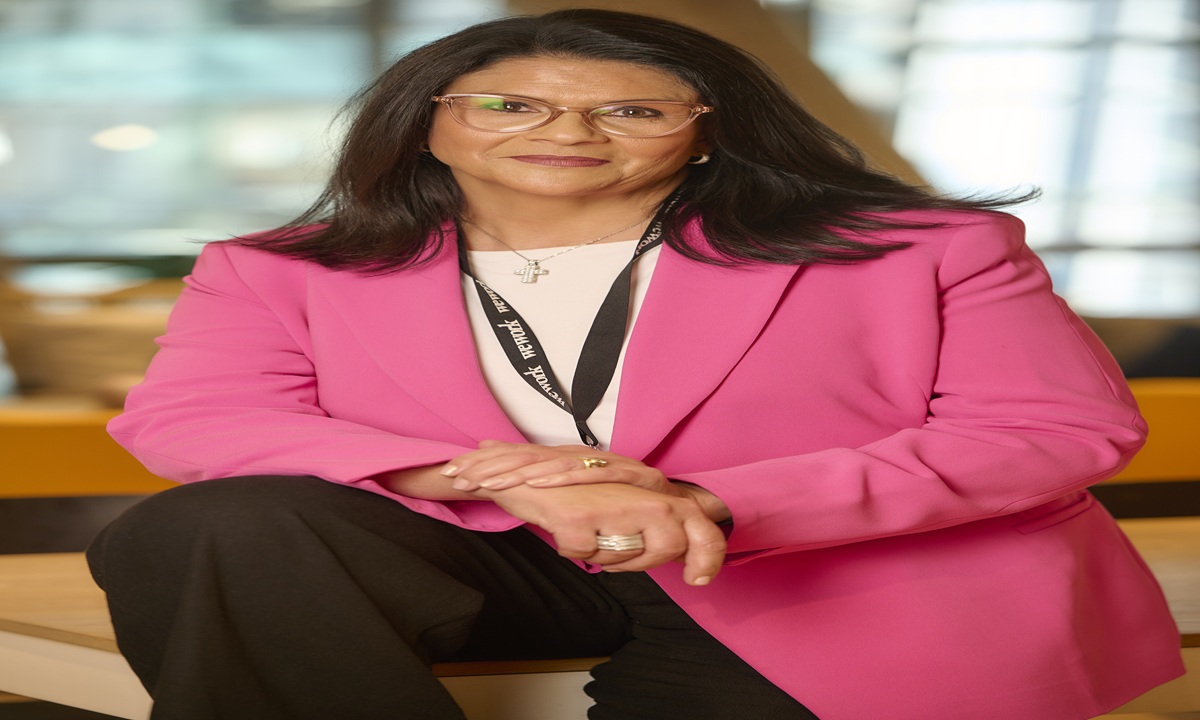Broadcasting
Afriland Properties Pledges to Beautify Lagos Skyline

Mrs. Uzo Oshogwe, Chief Executive Officer, Afriland Properties, has pledged her firm’s commitment to change and beautify Lagos skyline with its iconic projects.

Mrs Oshogwe stated this at the Sod turning ceremony of Falomo Towers, which signifies official commencement of a landmark partnership between Afriland Properties and Lagos State Development and Property Corporation (LSDPC), aimed at reconstruct former Falomo Shopping Complex to a premium sky-high real estate facility.
She noted that the redevelopment project was a revival of an important landmark, stressing that: “With the project, we tend to give Ikoyi back its lost landmark.
She stated that the iconic project would enhance and beautify Ikoyi skyline, adding that the partnership would be creating economic opportunities and social wealth that would transform the State and the country.
“With this project we intend to give Ikoyi back its lost landmark. This time bigger and better.
“This development will bring to the fore our promise to beautify and enhance the Lagos skyline, one iconic building at a time.
“We’re committed to Our Ideology which states that through our long-term investment in real estate, we’ll create employments, economic prosperity and social wealth that will transform Ikoyi, Lagos, Nigeria and the African continent”, she added.
In his remark, Mr. Tony Elumelu, foremost entrepreneur and banker, Chairman of Heir Holdings, owners of Afriland Properties, said the partnership was another testimony to the Lagos State Government’s belief in the private sector as a key development driver in the State, praising the Lagos political leadership for setting the pace of private sector inclusion in governance.

For surmounting obstacles that delayed the take-off of the partnership, Elumelu said Lagos remained the most hospitable environment to investors seeking profitable return on their investments.
He said: “I commend Gov. Sanwo-Olu and the political leaders of the State for believing in the private sector. What we are witnessing today attests to their beliefs in the private sector as driver of development in the State
“For private sector to do well, the political leadership must create the right environment. Lagos has set the pace in this direction. This partnership is a celebration of dialogue and this makes Lagos remain the most hospitable environment for investors.”
Speaking at the sod turning ceremony, Babajide Sanwo-Olu, Governor of Lagos State, said the construction flag-off ended a decade-long discussion with the developer to revive the project and build iconic towers that would turn around the fallow land for the benefit of the public.
The Governor said the project was another milestone achieved by his administration to renew urban amenities, stressing that the strategic implementation of the Lagos Masterplan had been dependent on the Government’s ability to forge workable partnership between the public and private sectors.
He said: “This is a phenomenal project that will bring back the lost ambience of Ikoyi. When this partnership was initiated 10 years ago, I was the Managing Director of LSDPC. It is interesting to note that we’ve all gone through arbitration but we didn’t throw a wrong punch. We agreed this project must not be thrown away. Today we are making a transaction that is bigger and better than what was initially proposed 10 years ago.
“This testifies to the uniqueness of public and private sectors in ensuring things can be made a lot better when we sit and agree. This is a clear example of what Public Private Partnership (PPP) model is out to achieve when partnerships and collaborations are pursued and implemented with seriousness. When we put our minds of possibilities to ideas, great things happen. This aptly describes the story of today’s flag-off of construction of Falomo Towers.”
Sanwo-Olu described Afriland Properties as a tested, trusted and reliable developer, saying the Corporation had found the right partner for the redevelopment project.
The Governor reiterated that the State Government would remain committed to ensuring the investors get full value for their investments, while promising to continue to pursue business environment reforms, including automation of land and property records to scale up transparency and efficiency that catalyse sustainable investments.
Hon. Ayodeji Joseph, Chief Executive Officer of LSDPC, on his part, said the project site evoked memories of a glorious past for Island dwell in the 1970s, noting that the Corporation took an informed decision to turn around the site by building residential apartments to provide additional accommodation to the growing middle class, business professionals and the swelling rank of young citizens.
He said: “Over forty years down the line, the Corporation in its decision to renew some of its facilities has deemed it fit to redevelop the site of the shopping complex, taking into consideration the realities of today’s needs as well as the environmental impact implications, this in turn has informed the decision to build residential apartments to provide additional accommodation to the growing middle class, business professionals and the swelling ranks of the upwardly mobile citizens of the state.
“For the corporation the journey to this ceremony has not been easy, like most laudable ventures we have encountered challenges that had taken time to be resolved. We want to put on record our appreciation for the guidance and doggedness of Mr. Governor without whose resourcefulness we would not have come this far.”
Broadcasting
SERAP, Editors Sue Niger Governor over Badeggi FM Shutdown Threat

Socio-Economic Rights and Accountability Project (SERAP) and the Nigerian Guild of Editors (NGE) have filed a lawsuit against Umar Bago, Niger State Governor, and the National Broadcasting Commission (NBC) over what they described as “the ongoing intimidation” of Badeggi FM Radio, Minna, and the threat to shut down the station.

This was contained in a statement on Sunday by Kolawole Oluwadare, deputy director, SERAP, accusing NBC of failing to stand in defence of the local station.
PUNCH Online had reported that Bago ordered the closure and the revocation of the licence of Badeggi Radio 90.1 FM in Minna over alleged public incitement.
However, in suit number FHC/L/CS/1587/2025, filed last Friday at the Federal High Court, Lagos, SERAP and NGE are seeking to determine “whether by Section 22 of the Nigerian Constitution 1999 (as amended) and section 2(1)(t) of the NBC Act, the NBC has the legal duty to protect Badeggi FM from the ongoing intimidation from the governor.”
They are also seeking “an order of perpetual injunction restraining the Niger state governor and NBC from further harassing, intimidating and/or threatening to shut down Badeggi FM radio, revoke its licence and profile the station’s owner.”
The groups argued, “The ongoing intimidation and threat by Mr Bago to strip Badeggi FM station of its licence, further threat to demolish the station’s premises and profile its owner is unlawful and a violation of the rights to freedom of expression, access to information, and media freedom.”
They described allegations of inciting violence against the station and its owner as “vague, unfounded and unsubstantiated and apparently made to silence the radio station.”
The suit, filed on behalf of SERAP and NGE by lawyers Kolawole Oluwadare, Oluwakemi Agunbiade, and Andrew Nwankwo, read in part, “The media plays an essential role as a vehicle or instrument for the exercise of freedom of expression and information – in its individual and collective aspects – in a democratic society.
“Intimidating, harassing and silencing critical or dissenting voices under the guise of vague and unsubstantiated national security concerns is a fundamental breach of the Nigerian Constitution and Nigeria’s international human rights obligations.
“The ongoing intimidation and harassment of Badeggi FM and its owner is capable of discouraging participation of the press in debates over matters of legitimate public concern ahead of the 2027 general elections.”
SERAP and NGE are therefore asking the court for the following reliefs, “A declaration that by the combined provisions of Section 22 Nigerian Constitution and section 2(1)(t) of the National Broadcasting Act, the NBC is obligated by law to protect Badeggi FM station and other broadcasting outlets in Nigeria from undue interference from unauthorised persons or entity.
“A declaration that the failure and/or neglect of the NBC to protect and defend the independence of the radio station against arbitrary executive interference constitutes a breach of its statutory duty to ensure fair, independent, and lawful broadcasting practices in Nigeria.
“A declaration that the ongoing intimidation and threat issued by Mr Bago to strip Badeggi FM station of its operational licence and further threat to demolish the station’s premises is unlawful and a violation of the rights to freedom of expression, access to information, and media freedom.
“A declaration that the threat issued by the Bago to strip Badeggi FM radio station of its operational licence encroaches upon the statutory powers of the NBC as provided for under section 2 of the National Broadcasting Commission Act.
“An order of perpetual injunction restraining the governor and NBC, its agents and privies from harassing, intimidating and/or threatening to revoke the operating licence of Badeggi FM station or any other broadcasting outlet in Niger State.”
It was said that no date has been fixed for the hearing of the suit.
Broadcasting
Amaarae Crowned Spotify’s EQUAL Africa Artist for August

Spotify has named Ghanaian trailblazer Amaarae as the EQUAL Africa artist for August, spotlighting her as one of the continent’s artists who continues to push creative and cultural boundaries with every beat, lyric, and look.

Amaarae, born Ama Serwah Genfi, raised between Ghana and the U.S.A often pulls her musical inspiration from the cultures and genres she grew up with. She has consistently pushed the boundaries of sound and identity, with her unique fusion of alternative, pop, R&B, and Afrobeats cementing her place as a singular voice in modern music.
Her musical journey took a turn in a computer lab in Ghana in 2009, where she taught herself to make beats on a cracked version of FL Studio. That moment sparked the fire for a career that would go on to produce game-changing projects like “The Angel You Don’t Know” and global hits such as “SAD GIRLZ LUV MONEY”.
Amaarae’s inclusion on Spotify’s Global Impact List for the first half of the year, highlighting the most-exported Ghanaian songs, was no surprise. She has become a symbol of how African music is travelling further, faster, and louder than ever before.
With her latest album BLACK STAR she returns to her Ghanaian roots with bold energy, crafting what she calls a “rallying cry for youth culture around the world. This album is bringing the alternative community to the forefront and being fearless about that.”
“I navigate the music world with balance, willpower, and strength. The challenges are real, don’t get me wrong, but I put my blinders on, lock into tunnel vision, and get to work. And when I come across another woman on the journey, especially a Black woman, I do my best to share knowledge, create opportunities, and lighten the load where I can,” says Amaarae.
As part of Spotify’s EQUAL programme, which amplifies women’s voices worldwide, Amaarae joins a growing list of African women shaping the future through sound and self-expression.
“Amaarae embodies the spirit of boundary-pushing creativity that EQUAL stands for,” says Phiona Okumu, Spotify’s Head of Music for Sub-Saharan Africa. “Her artistry is bold, distinct, and unapologetically authentic – qualities that continue to inspire a new generation of artists across the continent and beyond.”
We sat down with Amaarae to learn more about her and her music:
1. What is that one surprising thing your fans might not know about you?
Amaarae: I’m one step away from being legally blind! My vision is a -7 and I have astigmatism!!
2. When did you realise that making music was in your destiny and what is your WHY for pursuing this craft?
Amaarae: When I moved back home to Ghana in 2009, I was learning how to make beats and record myself at the back of the computer lab. Someone had installed a cracked version of FL.
3. Which African songs or artists did you grow up listening to?
Amaarae: The list goes on and on. Daddy LUMBA (RIP), Terri Bonchaka, MzBel, Abrewa Nana, Obrafour’s legendary album Pae Mu Ka, Sarkodie, Kwadwo Antwi. I could go all day.
4. To someone who has never heard your music, how would you describe the sound, tone, and style?
Amaarae: Let’s encourage listeners to be curious and adventurous! If you’re reading this and you’ve never heard my music, I dare you to go listen! And tell me how YOU would describe my sound.
5. Any advice for someone dreading following their dreams?
Amaarae: The regret does more damage than the effort.
Broadcasting
Humans + Machines: Building the workforce of the future

By Ursula Fear, Senior Talent Programme Manager | Salesforce
Is AI coming for your job, or is it already working beside you? As its use becomes more routine, artificial intelligence is looking less like a threat and more like a teammate: answering queries, making decisions, chasing leads, processing invoices, and drafting content around the clock.

Ursula Fear, Senior Talent Program Manager, Salesforce
This new class of digital labour is changing how teams function, how targets are met, and how people spend their time at work. From now on, almost every job, team, and company will involve AI agents – systems that can analyse vast datasets, apply human-like reasoning, and act independently. Their presence is set to influence workflows, increase productivity, support innovation, and redefine roles across the organisation.
Rather than replacing people, AI is tilting the workload. Salesforce research shows that 23% of HR teams plan to redeploy employees into roles that make better use of their uniquely human strengths. At the same time, agentic AI adoption is projected to surge by 327% over the next two years (from roughly 15% adoption today to about 64% by 2027).
This shift is tied to anticipated productivity gains of 30% per employee and labour cost reductions of 19%, equating to about $11,000 in savings per employee annually, based on Organisation for Economic Co-operation and Development (OECD) wage averages. Rather than replacing people, organisations are preparing to reskill and redeploy workers, enabling humans to focus on higher-value roles that emphasise creativity, strategy, and interpersonal skills.
A recent Gartner poll further found that 95% of customer service teams intend to retain human agents to help define and guide the role of AI, reinforcing the value of a “digital first, not digital only” approach. Gartner further says that by 2027, half of the organisations that planned to significantly reduce their customer service workforce will abandon those plans, highlighting the limits of going fully “agentless”.
For African countries, the rise of digital labour presents an opportunity to build modern, inclusive workforces without being bound by outdated development models. But realising this potential depends on sustained investment in skills training, digital infrastructure, and equitable access to AI tools.
Train for tomorrow
Africa has the world’s youngest population. It’s bursting with entrepreneurial energy. But many young people still don’t have access to the tools and skills that will define the next era of work. If the continent wants to lead in the digital labour revolution, it should act now by investing in digital infrastructure, prioritising skills development, and forging partnerships that make future-focused training widely accessible.
Yes, the skills gap is real and broadband internet is still a luxury in many communities. But on the upside, AI training doesn’t require a university degree. Much of it is free, online, and accessible to anyone with a smartphone and a curious mind.
That opens the door to governments, educators, businesses, and civil society to step up to update school curricula, expand digital infrastructure, and support public-private training partnerships. All of this matters: not just for economic growth, but for social inclusion, too.
If these foundations are put in place, African countries could not only meet the needs of their growing population but also leapfrog outdated development models.
From entry-level to in-demand
When AI begins to handle the simpler tasks, it’s easy to worry about what’s left for those starting out. Entry-level jobs aren’t disappearing though. Instead of doing routine work, newcomers will now need to build skills in oversight, collaboration, and using AI tools effectively from day one. The ladder still exists; it just starts in a different place.
This will require a different kind of training – not just technical know-how, but in soft skills like empathy, adaptability, ethical judgement, and communication, which are all human traits that help teams thrive.
AI’s presence in the workplace may be concerning, with reports of job cuts due to its adoption (here, here, here, and here), but all is not as it seems.
Research suggests a more balanced perspective: One of the most comprehensive studies, from the National Bureau of Economic Research, tracked 25,000 workers across 7,000 Danish firms using AI chatbots. It found no significant changes to jobs, wages, or working hours. Productivity rose by around 3%, without leading to layoffs.
The St. Louis Fed found something similar. Based on large-scale surveys in the US, researchers reported one in four workers now use generative AI weekly, saving on average just over two hours a week. Spread across the entire labour market, that translated into a 1.1% productivity gain. Crucially, there was no sign this efficiency came at the cost of jobs.
Adding to this, a 2024 study by Mäkelä and Stephany analysed over 12 million US job listings and revealed that demand is surging for “AI-complementary” skills such as resilience, teamwork, digital literacy, and analytical thinking. These are the very human capabilities that help people work effectively with AI. The study found AI-focused roles are nearly twice as likely to list these skills, and they command wage premiums of 5–10%. Even more telling: the positive impact of these complementary skills outweighs the substitution effects of AI by up to 70%.
These findings all suggest that AI isn’t replacing workers; it’s helping them work smarter and more efficiently. To thrive in this blended future, we need to prepare today, by building the right skills, expanding access, and embracing AI not as a threat, but as a partner in progress.
Because the future of work won’t be entirely human, nor entirely automated – it will be a blend of both.

 News1 day ago
News1 day agoGoogle Hit by AI-driven Cyber Attack

 General News1 day ago
General News1 day agoKuwait Busts Nigerian Cybercrime Ring Targeting Telecom Tower, Banks

 Telecom1 day ago
Telecom1 day agoMTN Nigeria’s Mega Billion Promo Turns Airtime into Fortune for Thousands Amid Economic Strain

 Telecom1 day ago
Telecom1 day agoI see Crisis, Resignations @ MTN, Airtel, Others – Primate Ayodele

 Telecom1 day ago
Telecom1 day agoT2 Commits to Innovation, Resilience as Customer-centric Ethos Form New Focus

 E-Business1 day ago
E-Business1 day agoPalmPay Partners AXA Mansard Health to Make Digital Insurance Accessible, Affordable

 E-Business1 day ago
E-Business1 day agoZequence Digital Boss Calls for Strong IP Laws Enforcement, to Protect Nigeria’s Software Sector

 News1 day ago
News1 day agoFIRS Rolls out e-invoicing System for Large Corporate Taxpayers



























